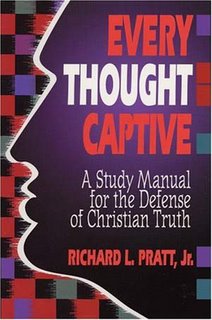Every Thought Captive

In working with youth I have found that one of the greatest resources for me, and for them is the book Every Thought Captive: A Study Manual for the Defense of Christian Truth written by Richard L. Pratt, Jr. Pratt wrote ETC while doing his grad work at Westminster Seminary. The purpose of the book is to give a proper explanation of presuppositional apologetic in popular language (for those of you who have tried to make any head-way in Van Till you will appreciate this). In fact, Pratt wrote this book with highschoolers in mind! Do not be fooled though, this is a valuable read for all ages. In a series of post over the next few days I would like to outline the basic ideas of the book for you.
PART I
As Christians we should work to destroy the speculations which are raised against the knowledge of God, and take every thought captive to the obedience of Christ. This is the overarching goal of Christian apologetics. Specifically, Christian apologetics pertains to the development and use of a defense for the Christian worldview. The proper foundation for such a task can only be the Scriptures of the Old and New Testaments. It is true that the Bible must be defended by Christian apologetics however, that does not mean that this defense should be built upon human reasoning. Because the Bible is the ultimate authority for faith and practice it must be the foundation upon which Christian apologetics are built. It would be foolish to emphasize the reasoning of man over the inspired Word of God.
If Christian apologetics are to be built upon the foundation of Scripture it is necessary for the Christian apologist to look at the biblical concept of creation first. One of the many differences between a Christian and non-Christian worldview is creation. For the Christian there is a difference between God the creator, and His creation. This perspective is absolutely necessary for the Christian apologist. When arguing for God one cannot forget who God is. God is completely Independent from man, and man is wholly dependent on God. God does not have any need that can be filled by His creation. Conversely, creation is dependent on the sustaining power that God now exhibits in His creation. Additionally man is dependent upon God for all knowledge, and morality. There is no truth apart from God, and apart from God there would be no distinction between good and evil.
The type of apologetic method that the Christian apologist chooses to use will depend greatly on his anthropology, and how he distinguishes creation from its Creator. The Bible looks at the history of mankind from three different perspectives: creation, fall, and redemption. Therefore, there are three different aspects of anthropology that have to be examined: the character of man before sin, the character of man in sin, and the character of man redeemed by Christ. Man is created in the image of God, and is distinct from the rest of creation. Man is able to reason, has a soul that will never be destroyed, and has been made to rule over the rest of creation. Before sin, Adam and Eve had a true knowledge and never overlooked their dependence upon God as creatures within God’s creation. However, Eve decided that dependence upon God was optional, and she did not need him for true knowledge, thus she ate of the fruit. Sin has so affected the human race that the human race has lost any thought of dependence upon God, and because of this all human reasoning has been corrupted. However, through the redemptive work of Christ one is able to turn away from the sinful human thought of independence from God, and know the God which all of creation depends on. Consequently the whole life of this believer in Christ becomes experiencing the change of regeneration, and being restored according to the original character which God created in His own image.


0 Comments:
Post a Comment
<< Home